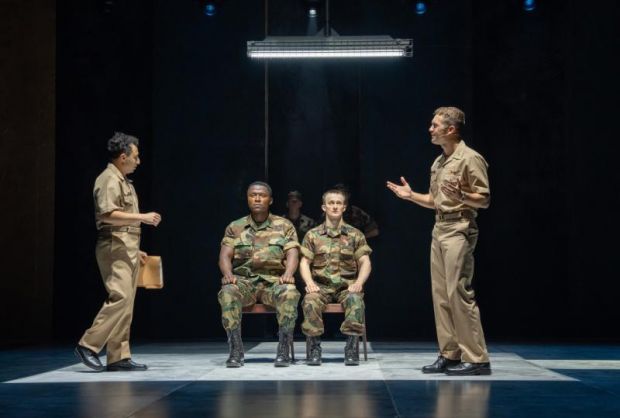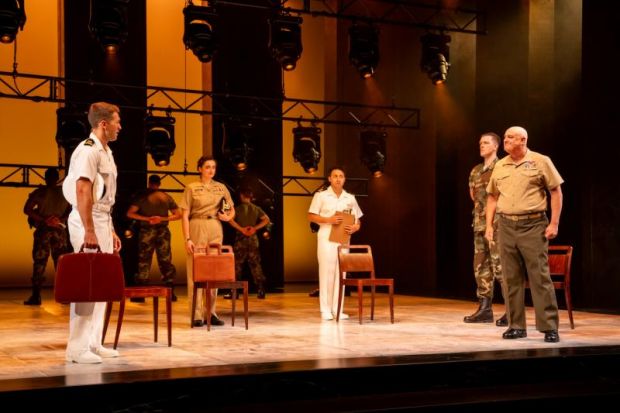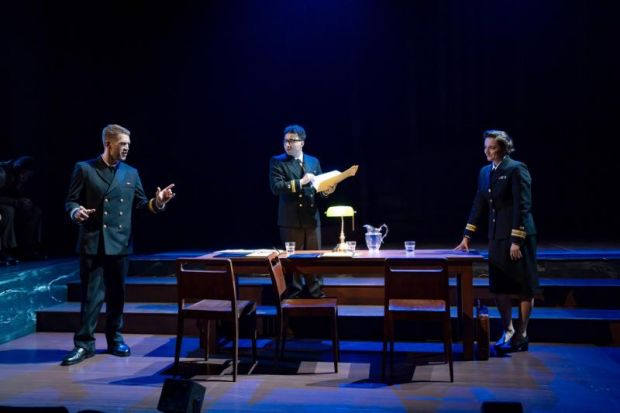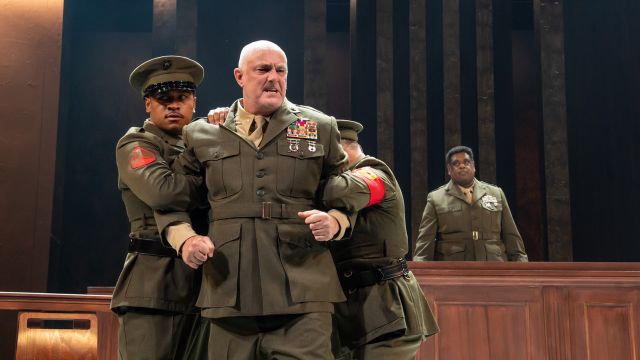A Few Good Men
Aaron Sorkin’s courtroom juggernaut has invaded QPAC’s Playhouse with all the controlled force of a well-drilled platoon. Under Daniel Evans’ meticulously calibrated direction, A Few Good Men becomes less a nostalgia piece from the ’80s and more a full-throated study of power, loyalty, and the brittle machinery of institutional honour. It is also, quite thrillingly, a rare opportunity to see a cast of this size take on dramatic text on a scale usually reserved for musical ensembles. QTC - you’ve spoiled us and we love it!
Evans approaches Sorkin’s language like choreography. The production never indulges the play’s inherent verbosity; instead, it makes a kinetic virtue of it. The rapid-fire dialogue is delivered with ferocious clarity, the pacing landing with the snap of a salute. Crucially, Evans refuses to let the staging become static. Characters move through the space with intent, as though navigating an ever-shifting battleground. Moments of stillness are rationed with military discipline, and when they arrive, they land like detonations.

Simone Romaniuk’s design creates a world of towering authority and cold scrutiny. The geometry of the set is monumental, a picture of rank and ritual that unfurls vertically as much as horizontally. The scale alone would be impressive; the ingenuity is what elevates it. Just as the audience adjusts to the architecture, Romaniuk’s use of flys and depth shifts the frame again, revealing an even more imposing courtroom that seems to rise, breathe, and bear down on the characters. Her costumes are equally exacting; textured with detail, weighted with authenticity, and beautifully tailored to delineate rank, role, and fracture.
Lighting designer Ben Hughes contributes a visual thesis of his own. His palette ranges from blistering interrogation whites to cinematic shadows worthy of a noir detective thriller. One glorious image—warm gold burning through Guantanamo Bay’s doors and soldiers cutting sharp silhouettes against it—is one of many gorgeous scenes he creates. Hughes’ timing is immaculate, each cue a scalpel in a production that requires both surgical precision and theatrical flourish.
Mike Willmett’s sound design threads subtly beneath the action, anchoring scenes with ambient tension while punctuating sharp turns in the narrative. His score, flecked with era-defining ’80s tracks and the raw cadence of military chants, builds a sound-world that is both evocative and deftly restrained.

Credit must also go to Gabrielle Rogers, whose dialect coaching ensures accents remain grounded and consistent throughout—no small feat given the pace and complexity of the text.
The cast, a formidable blend of established masters and rising talents, meet Sorkin’s linguistic onslaught head-on. Their focus is absolute. Their discipline, palpable. Just like a disciplined military force, there isn’t a weak link amongst them.
Courtney Cavallaro’s Joanne Galloway is magnetic. She’s sharp, warm, and unflinching, charting the character’s smarts and spirit with thrilling precision. Doron Chester brings sparkling comic timing and genuine heart to Sam Weinberg, never letting humour soften the stakes. Todd MacDonald’s trio of roles demonstrates his extraordinary versatility, and his characterisation of Cmdr. Stone is particularly compelling.
Reagan Mannix makes Louden Downey beautifully vulnerable, his contrasting military strength and personal fragility rendered with quiet truth. Donné Ngabo is riveting as Dawson, all clenched honour and coiled moral injury; his physical work is superb. Hugh Parker delivers a performance of remarkable nuance as Markinson, he’s haunted, conflicted, achingly human. It is acting of the highest order.

At the centre, George Pullar takes on Daniel Kaffee with exhilarating originality. He resists imitation of the film, crafting a performance that’s charismatic, restless, and fully lived-in. His command of the role’s relentless dialogue is nothing short of masterful. Opposite him, Hayden Spencer’s Jessep is a study in dangerous charm. Spencer offers a performance that prowls like a tiger. Whether he whispers or shouts, he holds the stage with the kind of magnetic confidence that only deep mastery of the craft can produce.
Perhaps the production’s most striking achievement lies in its evocation of collective behaviour. Evans draws his Marines with an almost animalistic vocal quality; when on duty, their clipped responses echo like a dog pack’s bark; a chilling auditory reminder of the culture the play dissects.
In all, Queensland Theatre Co. and QPAC have delivered a gripping, muscular revival that honours Sorkin’s early career spark while carving out its own distinct resonance. This is theatre made with intellect, brawn, and a fierce sense of purpose. It surges forward with questions we still haven’t answered: who gets to define honour, what does loyalty truly cost, and whether truth can ever triumph without hurting innocent people in the crossfire.
At the risk of sounding corny, last night, we didn’t just see A Few Good Men, we saw 16 astounding performers supported by a crew of many more, and they weren’t merely good, they were impeccable.
Kitty Goodall
Photography by Stephen Henry
Subscribe to our E-Newsletter, buy our latest print edition or find a Performing Arts book at Book Nook.

